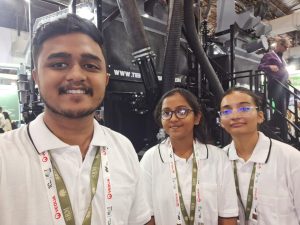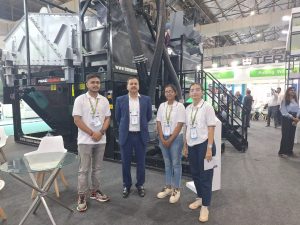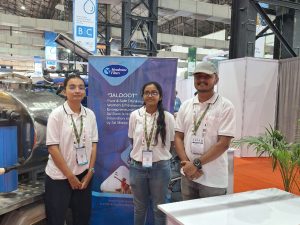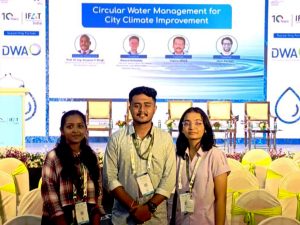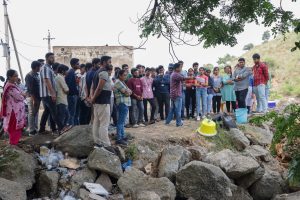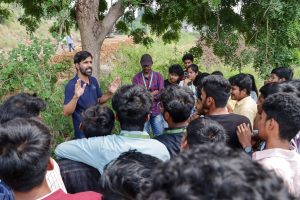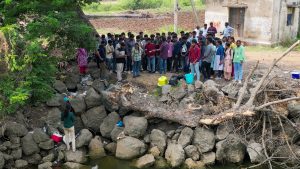Dr Karthik Rajendran Honoured with Young Scientist Award
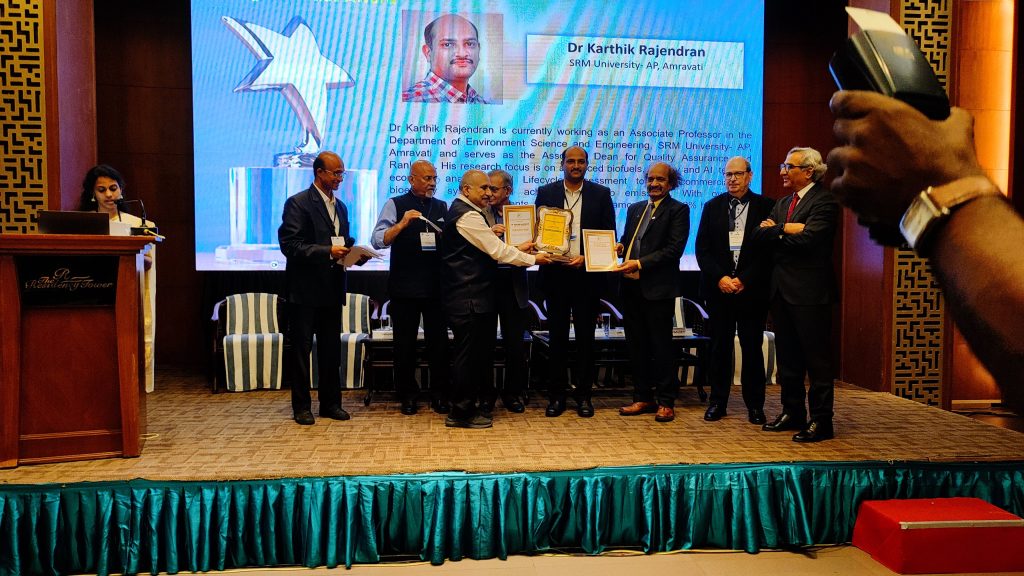
Dr Karthik Rajendran, Associate Professor, Department of Environmental Science & Engineering has been conferred with the Young Scientist Award from the Biotechnology Society of India. The award was received by Dr Karthik Rajendran from Padmashree Prof. GD Yadav (ICT Mumbai).
This prestigious award is given to scientists less than 35 years old for their work carried out in India. This is a testament to the work he has been doing at SRM University-AP for the last 4.5 years. The Jury of the award committee consisted of twenty-three experts across India and the Globe.
In the last 20 years of its inception, only once before such an award was given to any private institution.
- Published in Departmental News, ENVS News, News
MSc Environmental Science Students Attend Workshop on Sustainable Wastewater Management
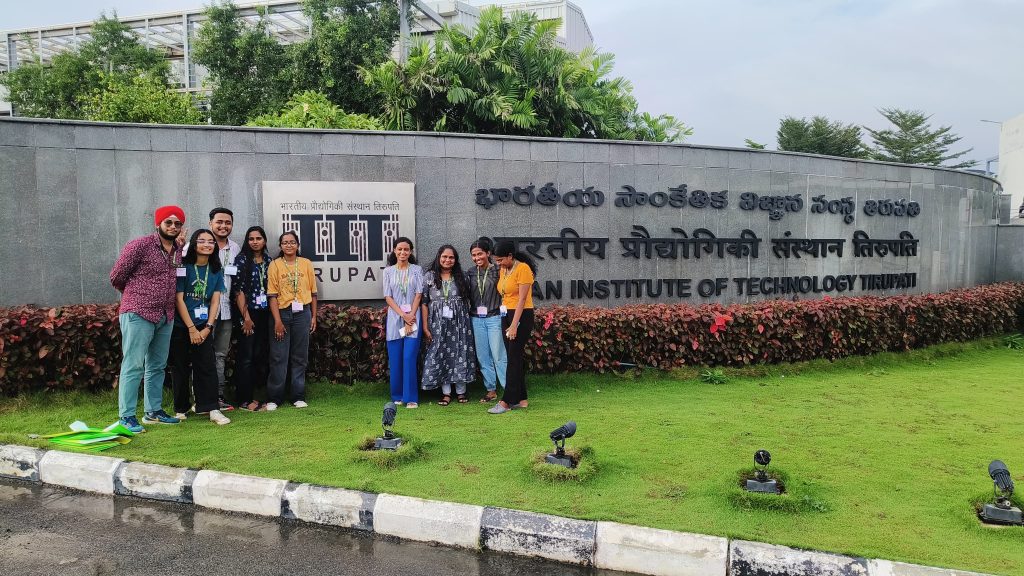
MSc Students from the Department of Environmental Science and Engineering had a delightful opportunity to participate in the Workshop on “Sustainable Wastewater Management: The Role of Advanced Treatment and Sensing Technologies” organised by the Department of Civil and Environmental Engineering, Indian Institute of Technology Tirupati on December 01 and 02, 2023. The students got to learn about novel technologies available for wastewater treatment and also visited three wastewater treatment plants at IIT Tirupati that showcased wastewater recycling technologies. Fruitful discussions with both academicians and industrial experts on current challenges in wastewater management and innovations and opportunities in the water sector were the highlights of the workshop.
- Published in Departmental News, ENVS News, News
Dr Karthik Rajendran Receives Hiyoshi Young Leaf Award
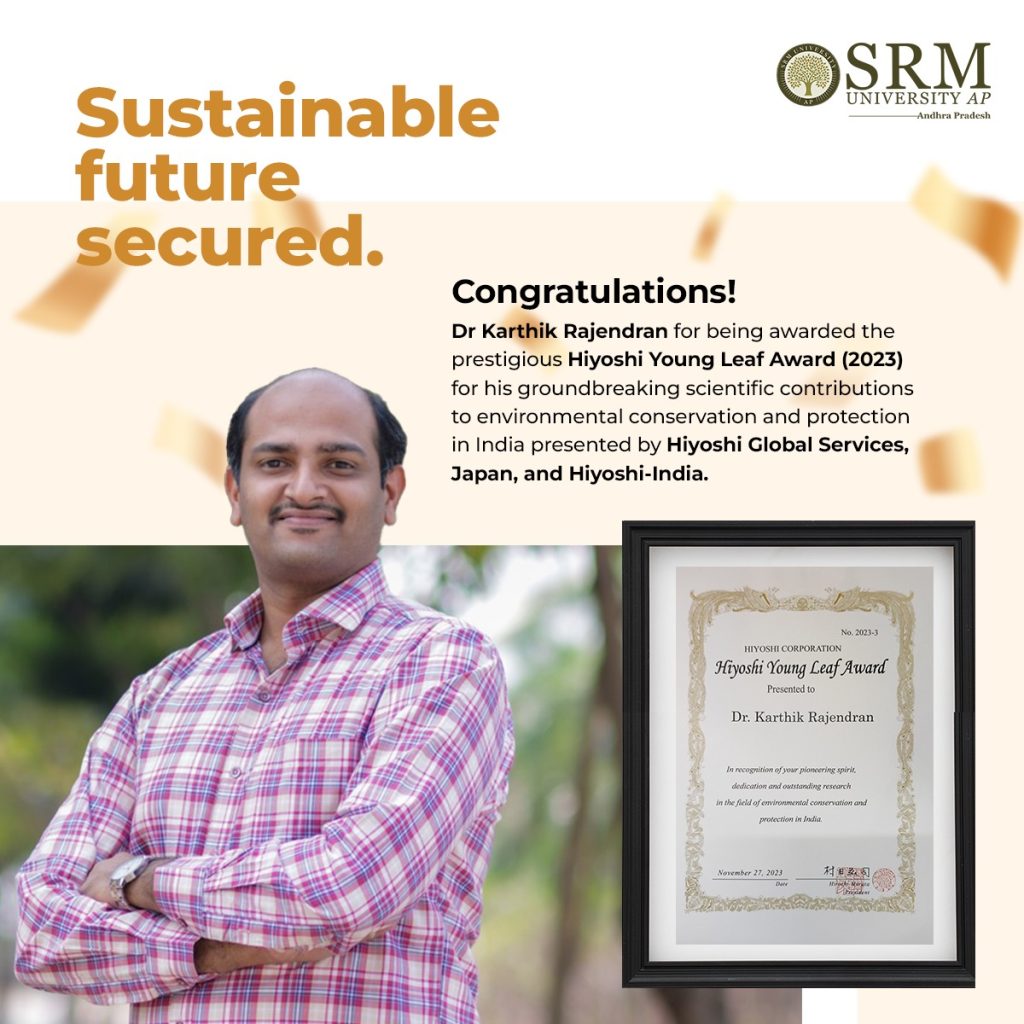
A proud moment for SRM University-AP as Dr Karthik Rajendran, Associate Professor in the Department of Environmental Science and Engineering, receives the prestigious Hiyoshi Young Leaf Award.
The Hiyoshi Young Leaf Award recognises novel, innovative, and outstanding scientific research and application in the field of environmental conservation and protection in India. Dr Rajendran’s dedication to research, innovative approaches, and impact on the academic community have earned him this esteemed accolade.
“We extend our heartfelt congratulations to Dr Karthik Rajendran for this well-deserved recognition,” said Prof. Manoj K Arora, Vice Chancellor, SRM University-AP. “His exemplary work reflects the varsity’s commitment to fostering excellence in the field of Environmental Science and Engineering.”
“It is a great honour to be receiving the Hyoshi Young Leaf Award, it motivates me further to work harder and with greater passion, I would like to thank Hiyoshi Corporation for presenting me with this award,” said Dr Karthik Rajendran.
Dr Rajendran has received several awards in the past for his remarkable contributions to the field of environmental science and engineering. He has been recognised as one of the top 2% of scientists by Stanford University and has also been honoured with the Young Scientist Award among others. Apart from his research, Dr Rajendran is also dedicated to educating the next generation of environmental scientists and engineers, thereby playing a crucial role in shaping future leaders in the field.
SRM University-AP celebrates this milestone in Dr Rajendran’s career and looks forward to continued excellence in his contributions to environmental science.
- Published in ENVS News, Faculty Achievements, News
MSc Environmental Science Students Secure Paid Japanese Internship
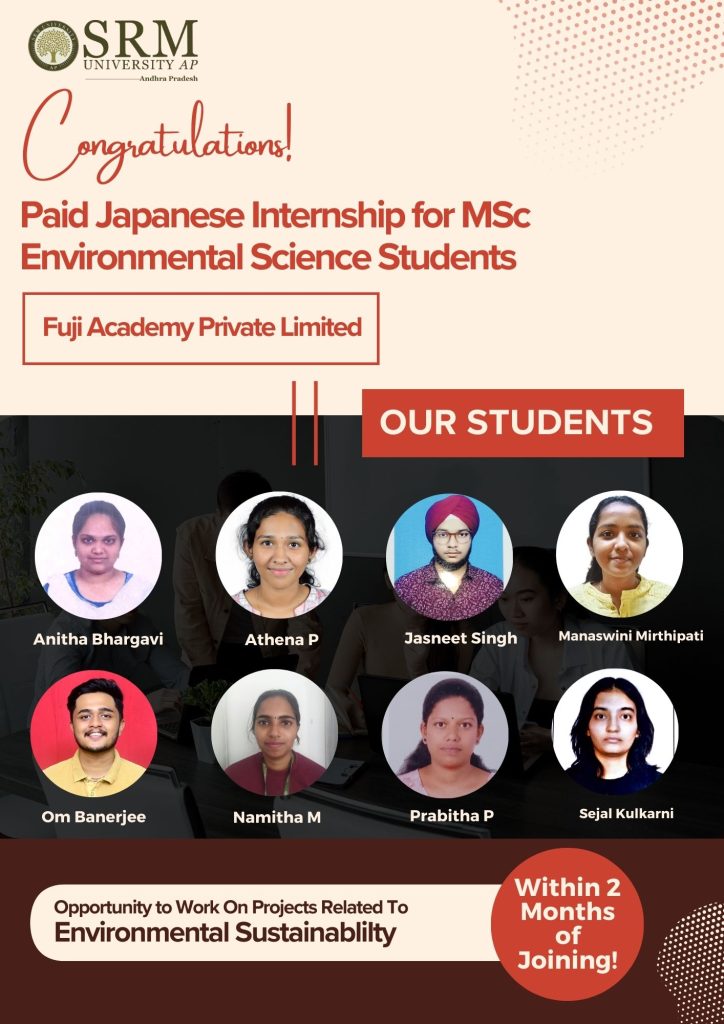
The Department of Environmental Science and Engineering takes pride in announcing that 8 students of MSc Environmental Science programme have bagged a paid internship in the Fuji Academy Private Limited, a prestigious Japanese company. The students shall work on projects related to environmental sustainability and participate in various engaging activities like workshops and training sessions, in addition to networking with different stakeholders in the sustainability sector. It is important to note that the students secured this internship within 2 months of commencing their MSc programme.
- Published in Departmental News, ENVS News, News, Students Achievements
Innovative Study on Microplastics in Groundwater Published
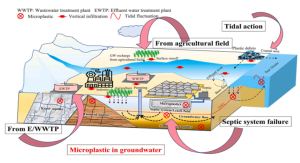 Dr Kousik Das and Dr Deep Raj, Assistant Professors in the Department of Environmental Science and Engineering (EVSE) at SRM University AP, along with Dr Uttiya Dey (Post-doc) and PhD Scholar Mr. Mijanur Mondal, have achieved a significant milestone with the publication of their research paper, “Microplastics in groundwater: An overview of source, distribution, mobility constraints and potential health impacts during the Anthropocene.
Dr Kousik Das and Dr Deep Raj, Assistant Professors in the Department of Environmental Science and Engineering (EVSE) at SRM University AP, along with Dr Uttiya Dey (Post-doc) and PhD Scholar Mr. Mijanur Mondal, have achieved a significant milestone with the publication of their research paper, “Microplastics in groundwater: An overview of source, distribution, mobility constraints and potential health impacts during the Anthropocene.
This pioneering work has been published in the esteemed journal “Groundwater for Sustainable Development,” a Q1 journal with an impressive Impact Factor of 5.9. The paper offers a comprehensive overview of the sources, distribution, mobility constraints, and potential health impacts of microplastics in groundwater, contributing valuable insights to the scientific community.The research team’s dedication to advancing environmental science and addressing crucial issues such as microplastic pollution underscores SRM University AP’s commitment to impactful research and innovation.
Abstract
Microplastics (MPs) are the tiny particles of plastic of > 5 mm in diameter that have already been detected in various environmental matrices like soil, sediment, and surface water, and recently in groundwater also. The occurrence of MPs in groundwater depends up on the transportation through recharge and may controlled by source and local hydrogeology, and partly on the process of surface water-groundwater interaction (SW-GW). Groundwater recharge from agricultural stagnant water, losing streams near dumping sites and agricultural fields, effluents from wastewater treatment plants, septic system failure, etc., are the potential sources of MPs in groundwater. The factors like sea level rise and tidal pumping are among the major factors that may control the migration of MPs in coastal aquifers, along with the physical and chemical properties of the aquifer media. These MPs have another ecological concern as they can adsorb persistent organic pollutants as well as heavy metals and transfer them to animal tissues through the food chain. No such study has been done on the existence, profusion, or environmental factors that contribute to MP pollution in the groundwater in relation to the present climate change scenario. Understanding the extent of MP contamination in groundwater systems is necessary for developing effective management strategies and minimizing their impact on the environment and human health. This study focuses on the source along with the controlling factors of the migration of MPs towards groundwater, including the effect of climate change.
Citation
Dey, U.,Raj, D., Mondal, M., Roy, P., Mukherjee, A., Mondal, N.K. and Das, K. (2023). Microplastics in groundwater: An overview of source, distribution, mobility constraints and potential health impacts during the Anthropocene. Groundwater for Sustainable Development. 23: 101036
Practical implementation and social implications of the research
Microplastic pollution is among the recent emerging pollutants which is still understudied. n. Studies are being conducted mainly focusing the MP contamination in surface water, marine environment and soil, and very limited studies are available to address the source of MPs in groundwater. Even there is lack of standard methods for the effective detection, both qualitatively and quantitatively, of MPs. However, no such study has been done on the existence, profusion, or environmental factors that contribute to MP pollution in the groundwater in relation to the present climate change scenario. As groundwater is a major source of drinking water worldwide, it is of immense importance to enquire more about the source, transport pathways, controlling factors and human health effects of MPs for the safeguard of this valuable resource. Understanding the extent of MP contamination in groundwater systems is necessary for developing effective management strategies and minimizing their impact on the environment and human health. Our study was conducted to mainly focus on the source along with the controlling factors of the migration of MPs towards groundwater including the effect of climate change. The findings of our study would provide valuable insights into the characteristics of MPs in the environment and suggest efforts to mitigate their impact on ecosystems as well as on human health.
Collaborations
The collaborators in this present study are:
- Prof. Abhijit Mukherjee, Department of Geology and Geophysics & School of Environmental Science and Engineering, IIT Kharagpur, West Bengal
- Prof. Naba Kumar Mondal, Department of Environmental Science, The University of Burdwan, West Bengal
Future research plans
Microplastic is one of the recent emerging pollutants which is still understudied. The research has just started to detect MPs in different environmental media as well as to establish effective removal technologies. Our future plans with MP research are as follows:
- To measure the MPs concentration in different coastal areas in India, as the oceans are the major sink for any pollutants, to obtain baseline information about the contamination load
- To detect how much amount of MPs are coming through the major rivers by linking the land use and land cover pattern so that the major sources can be detected
- Detection of MPs in the freshwater aquifer to adopt effective management strategies to safeguard the groundwater
- Development of effective and environment-friendly MP removal technologies
- Published in Departmental News, ENVS News, News, Research News
MSc Environmental Science Students Shines at 7th University Challenge
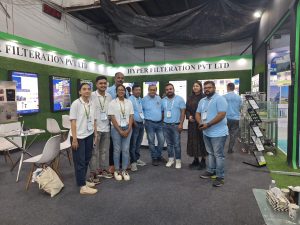
In a remarkable display of talent and dedication, three MSc Environmental Science students from the Department of Environmental Science and Engineering showcased their expertise at the 7th University Challenge, India, held on 18-19 October 2023 at the Bombay Exhibition Centre, Goregaon, Mumbai. Mr Om Banerjee, Ms Sejal Sudhir Kulkarni, and Ms Manaswini Mirthipati Subrahmanya exhibited exceptional knowledge and passion for environmental science at the event organised by the German Water and Waste Association (DWA) as a part of IFAT India 2023. IFAT- India is India’s acclaimed trade fair that showcases environmental technologies for sustainable solutions to problems in the subcontinent. The students interacted with professionals from diverse sectors, such as water, sewage, solid waste, and recycling, and explored their innovative solutions and services.
Their participation not only reflects their commitment to academic excellence but also underscores the Department’s dedication to nurturing top-tier talent in the field of environmental science. We extend our heartfelt congratulations to these students and anticipate their continued success in their academic and professional endeavors.
- Published in Departmental News, ENVS News, News
Field Visit for Environmental Awareness
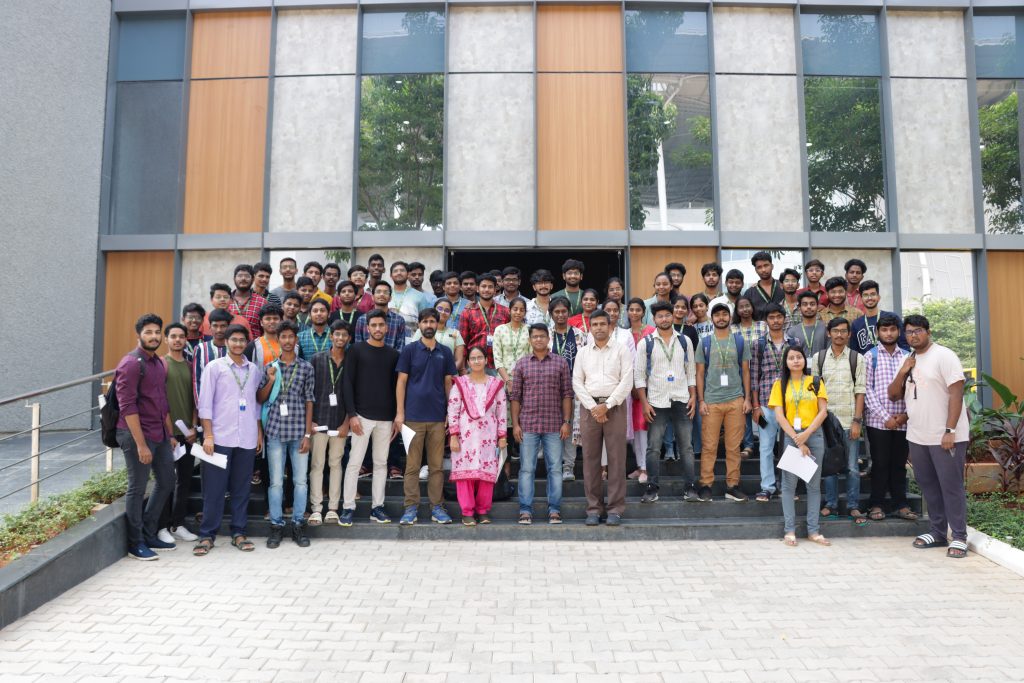
The Department of Environmental Science and Engineering organised a field visit for first-year odd semester students as a part of their Environmental Science course (VAC-101) from October 16-20, 2023 around the vicinity of SRM University-AP campus. The students were made aware of the surrounding land-uses, their biodiversity, impacts and importance to the environment. Observations were made on different threats like pollution, plant invasion, fertilizer run-off, etc. and the students were explained what can be done as an individual and as a community to protect our resources. Practical know-hows on vegetation and water sampling were also demonstrated by different faculty members. The students returned with a heightened sense of stewardship towards environmental protection.
- Published in Departmental News, ENVS News, News
ICSSR Sanction for Research Project on PM Krishi Sinchai Yojana
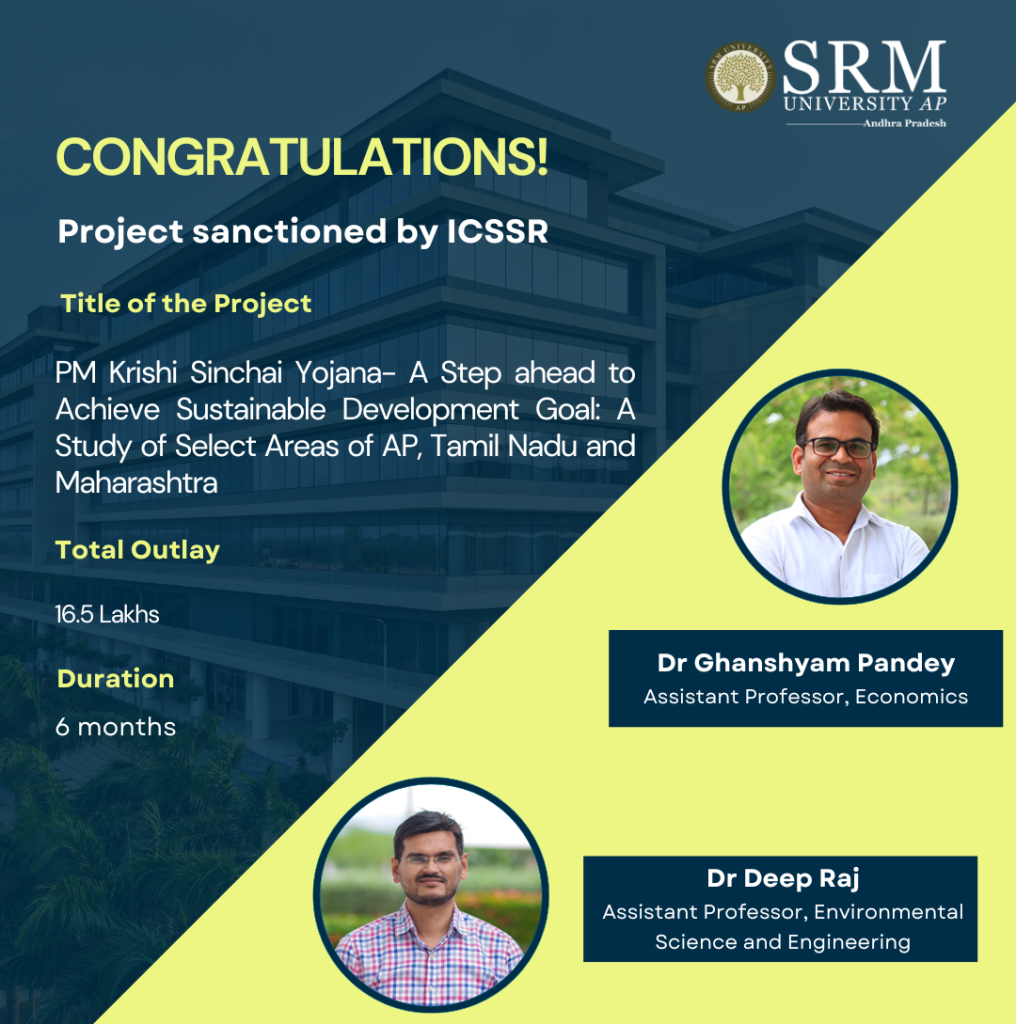
SRM University-AP takes pride in the achievements of its students and faculty. Dr Ghanshyam Pandey, Assistant Professor, Department of Economics and Dr Deep Raj, Assistant Professor, Department of Environmental Science and Engineering were sanctioned a project by the Indian Council of Social Science Research, New Delhi (ICSSR). The research project titled, “PM Krishi Sinchai Yojana- A Step Ahead to Achieve Sustainable Development Goal: A Study of Select Areas of AP, Tamil Nadu and Maharashtra” was sanctioned a total outlay of 16.5 Lakhs for a period of 6 months.
Abstract
Agriculture in India is dominated by smallholders. Yet only about 55% of India’s agricultural land is irrigated. The frequent occurrence of extreme climate events such as drought and heat are some of the main reasons for low agricultural productivity, food insecurity, and persistent poverty in developing nations. In this respect, irrigation plays a significant role in addressing climate change. However, irrigation costs are also very high for small-scale farmers because of their low incomes. Therefore, they do not have the resources to irrigate 100% of their land. In this context, PMKSY is a step towards resolving this problem in India and was introduced by the NDA government in 2015 by Har Khet Ko Pani. Therefore, the present study will examine the coverage, impact, adaptation and constraints of PMKSY in the Indian states of Andhra Pradesh, Tamil Nadu and Maharashtra.
Congratulations on this remarkable achievement!
- Published in Departmental News, Economics News, ENVS News, News, Research News
Formulation of new designs and processing parameters for continuous hydrogen production
 Dr Lakhveer Singh, Assistant Professor in the Department of Environmental Science, SRM University-AP, sets forth advanced avenues of scientific research on maintaining high current densities which is a key challenge in scaling-up microbial electrolysis cell (MEC) reactors.
Dr Lakhveer Singh, Assistant Professor in the Department of Environmental Science, SRM University-AP, sets forth advanced avenues of scientific research on maintaining high current densities which is a key challenge in scaling-up microbial electrolysis cell (MEC) reactors.
“Scaling-up Up-flow Microbial Electrolysis Cells with a Compact Electrode Configuration for Continuous Hydrogen Production”, published in the Bioresource Technology journal is about a novel 10 L microbial electrolysis cell (MEC) reactor with a total electrode surface area greater than 1 m2 was designed and evaluated for hydrogen production. Performances of the reactor suggest that the longitudinal structure with the parallel vertical orientation of the electrodes encouraged high fluid mixing and the sheet metal electrode frames provided distributed electrical connection. A high volumetric H2 production rate of 5.9 L/L/d was achieved at a volumetric current density of 970 A/m3 (34 A/m2). The Impact factor of the journal is 7.53.
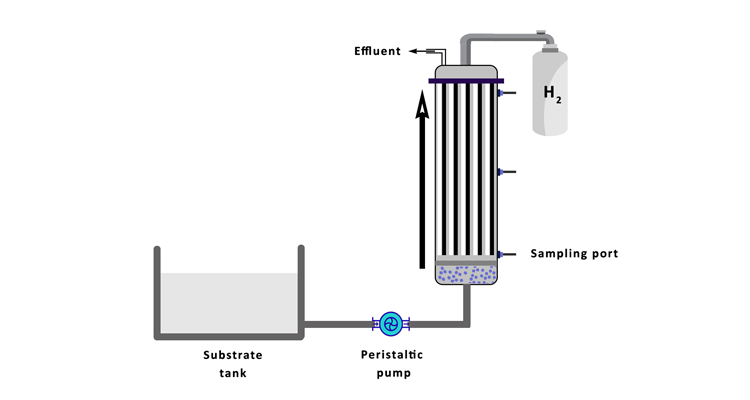 Dr Singh encapsulates that the technology and the model to be developed can be used to formulate new designs and processing parameters for producing H2 from other types of feedstocks and/or using engineered microbes developed by other researchers, which could solve the fuel problem for modern society. This work has been done in collaboration with Prof. Hong Liu from Oregon State University (OSU), USA.
Dr Singh encapsulates that the technology and the model to be developed can be used to formulate new designs and processing parameters for producing H2 from other types of feedstocks and/or using engineered microbes developed by other researchers, which could solve the fuel problem for modern society. This work has been done in collaboration with Prof. Hong Liu from Oregon State University (OSU), USA.
Dr Singh is an Editorial Board member of the Journal of Biomass Conversion and Biorefinery – Springer (I.F. 2.60) and a Guest Editor for Bioresource Technology Reports- Elsevier. His future research targets to reduce the component costs and test the proposed design using real waste streams, as well as continue to increase the reactor volume.
Read the full paper here: https://doi.org/10.1016/j.biortech.2021.125030
- Published in ENVS News, News, Research News
Dr Lakhveer Singh expounds alternate energy sources
 A scientific research paper has been published by Dr Lakhveer Singh, Assistant Professor in the Department of Environmental Science, SRM University-AP.
A scientific research paper has been published by Dr Lakhveer Singh, Assistant Professor in the Department of Environmental Science, SRM University-AP.
“The Role of Conductive Nanoparticles in Anaerobic Digestion: Mechanism, Current Status, and Future Perspectives”, published in the Chemosphere Journal, discusses in detail the application of conductive nanoparticles to enhance the AD process efficiency and the interaction between microbes in anaerobic conditions for electron transfer with the help of CNPs. Application of a variety of conductive nanomaterials as an additive is discussed with their potential biogas production and treatment enhancement in the anaerobic digestion process. The Impact factor of the journal is 5.77.
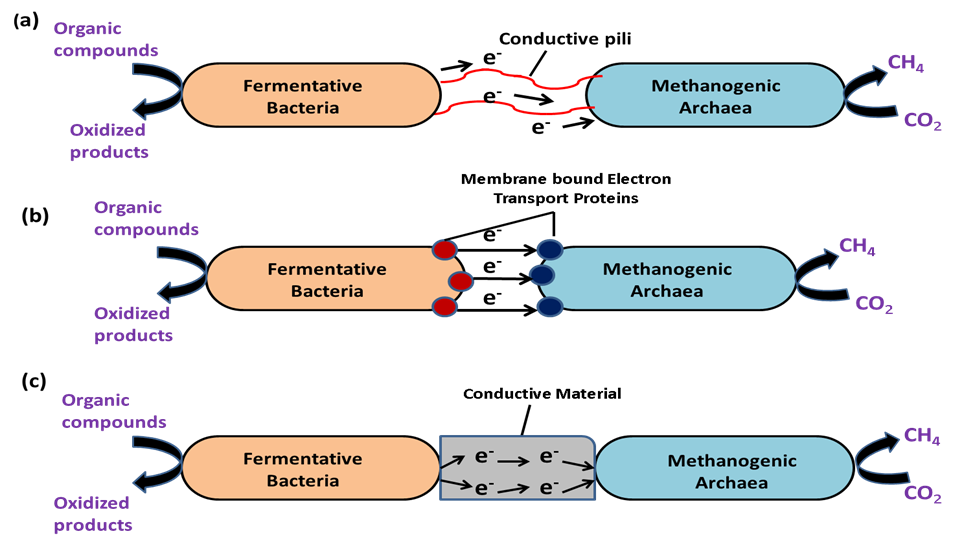
Dr Singh is an Editorial Board member of the Journal of Biomass Conversion and Biorefinery – Springer (I.F. 2.60) and a Guest Editor for Bioresource Technology Reports- Elsevier. His future research targets to reduce the component costs and test the proposed design using real waste streams, as well as continue to increase the reactor volume.
Read the full paper here: https://doi.org/10.1016/j.chemosphere.2021.130601
- Published in ENVS News, News, Research News


